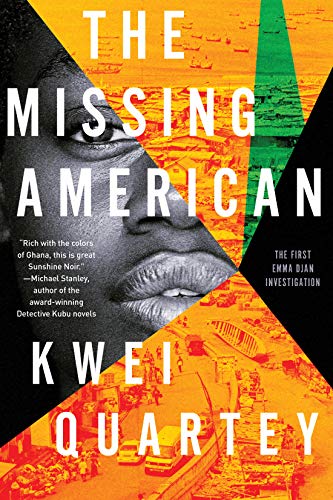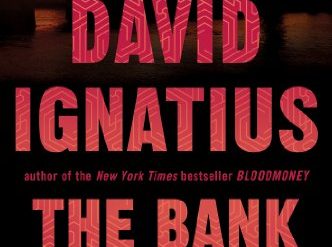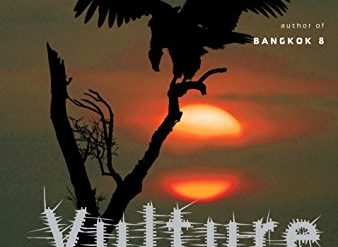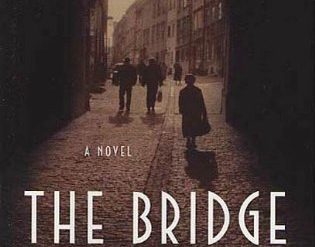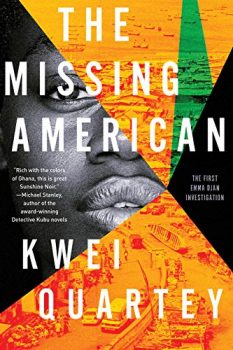
Estimated reading time: 5 minutes
Why do you read mysteries and thrillers? For me, the answer’s simple. I read them as much for the light they shed on society as for the suspense and the intellectual satisfaction of seeing a mystery solved. That’s particularly true in the case of historical novels and of stories that take place in unfamiliar settings. Today, for example, the emerging wave of African mystery and suspense fiction provides a rich source of insight about that fast-changing continent. And one of the most intriguing books to come along in quite awhile that casts light on an unfamiliar corner of African society today is The Missing American, the new novel by the Ghanaian-American author Kwei Quartey.
A hapless American falls in love online with a Ghanaian woman
The “missing American” is Gordon Tilson, a retired businessman and widower in Washington, DC, who travels to Ghana to meet the lovely Ghanaian woman he’s met online and fallen in love with. But we don’t meet Gordon, or learn the story of how he became infatuated with “Helena” until long after becoming acquainted with the cast of characters in Accra who share the spotlight with him. They span the spectrum from the most senior reaches of the Ghanaian police to the sakawa boys who make their often opulent living by cheating Europeans and Americans through a variety of online scams.
The Missing American (Emma Djan #1) by Kwei Quartey (2020) 432 pages ★★★★☆
Nominated for the 2021 Edgar Award for Best Novel
A grim view of African society today
Among the vivid characters you’ll meet in The Missing American are:
- Emma Djan, a constable in the Ghana Police Service (GPS), who is the protagonist of a planned series of thrillers of which this novel is the first
- The corrupt Inspector General of Police, James Akrofi, an intimate friend of Ghana’s president since childhood, and his wife Josephine
- Akrofi’s immediate subordinate, Cleophus Laryea, the Deputy Commissioner of Police, a sexual predator
- Nii Kwei, the sakawa boy who defrauds Gordon Tilson, and his gang
- Kweku Ponsu, a “fetish priest” with whom a stable of sakawa boys share their plunder in the belief that he imbues them with superpowers
- Ghanaian investigative journalist Sana Sana, who is on a crusade to unmask the officials who enable the sakawa boys
- Detective Inspector Doris Damptey and the mixed bag of her fellow senior officers in the GPS
A grim tale about those “online Nigerian scams”
As you can discern, the story in The Missing American revolves around the all-too-real phenomenon of Internet fraud that is a continuing reality in Ghana. And Quartey’s picture of the sakawa system is fascinating. The idea originated “in Nigeria, where it was called ‘419’ after a section in Nigeria’s criminal code. The origins dated to much earlier than most people realized—as far back as 1920. Now, the notorious old 419 scams with Nigerian ‘princes’ were all but gone, replaced by more effective Internet scams.” But those scams resembled nothing like the strictly businesslike online scams coming from Russia, Ukraine, and elsewhere in Eastern Europe. In Ghana, the sakawa boys operate in thrall to traditional fetish priests who insist their obscure rituals are the secret of the boys’ success.
The action in The Missing American unfolds over a period of five months, from early January to mid-May. Much of the story spins out in chronological order, but Quartey repeatedly circles back to past events to clarify and explain the otherwise mysterious course of events. All in all, this portrait of one aspect of the downside of African society today is a satisfying and endlessly interesting read.
About the author
Born in Accra and educated in Ghana and at Howard University and UCLA, Kwei Quartey is a retired surgeon who has written seven novels to date. He practiced medicine in California for twenty years.
For further reading
I’ve also reviewed the second Emma Djan novel, Sleep Well, My Lady (The truth lies undercover in this Ghana murder mystery) and the third, Last Seen in Lapaz (A missing woman, a murder, and a young PI).
I’ve also reviewed the first three books in Quartey’s Darko Dawson series of police novels:
- Wife of the Gods (A fetish priest, an herbal healer, and a murdered AIDS outreach worker)
- Children of the Street (An outstanding African police procedural)
- Murder at Cape Three Points (A captivating murder mystery set in Ghana)
For other excellent mysteries and thrillers set in contemporary Africa, see:
- The Death of Rex Nhongo by C. B. George – A satisfying thriller set in Zimbabwe
- The Hairdresser of Harare by Tendai Huchu – Zimbabwe through the eyes of a single mother
- My Sister the Serial Killer by Oyinkan Braithwaite – Two Nigerian sisters and three murders
- The Night Ranger (John Wells #7) by Alex Berenson – An outstanding thriller set amid the refugee crisis in Kenya and Somalia
Check out 20 top books about Africa, including both fiction and nonfiction.
You might also enjoy my posts:
- 26 mysteries to keep you reading at night
- Top 10 mystery and thriller series
- 20 excellent standalone mysteries and thrillers
- 30 outstanding detective series from around the world
- Top 20 suspenseful detective novels
And you can always find my most popular reviews, and the most recent ones, on the Home Page.

